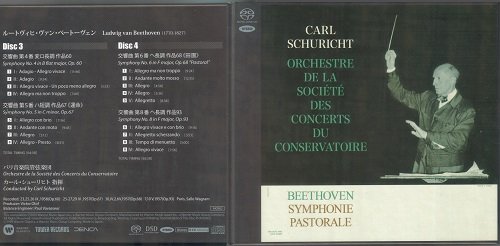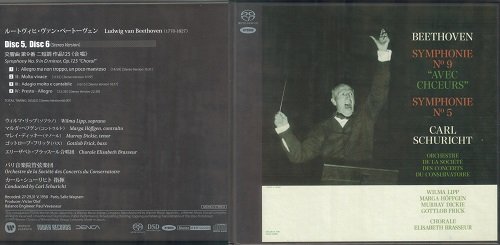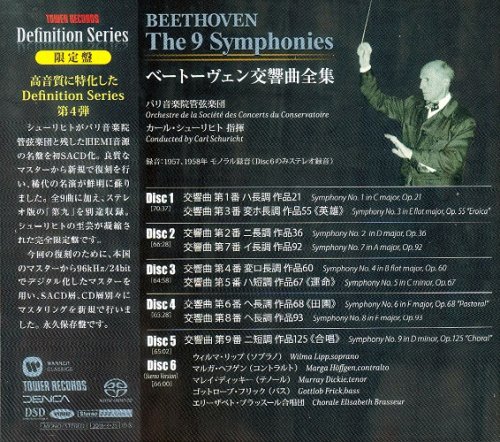
Carl Schuricht - Beethoven: 9 Symphonies (1958) [2016 SACD Definition Serie]
BAND/ARTIST: Carl Schuricht
- Title: Beethoven: 9 Symphonies
- Year Of Release: 1958 [2016]
- Label: Tower Records [TDSA-16~21]
- Genre: Classical
- Quality: DSD64 image (*.iso) / 2.0 > 1-bit/2.8224 MHz
- Total Time: 06:36:00
- Total Size: 10,5 GB (+3%rec.)
- WebSite: Album Preview
Beethoven, the culmination of Schuricht art: The long-awaited first SACD of all symphonies. Separate recording of the ninth stereo version.
The first SACD version of the famous EMI sound source left by Schuricht with the Orchestra of the Paris Conservatory. A new reprint was performed from a high-quality master, and a rare masterpiece was clearly revived. In addition to a total of 9 songs, a stereo version of "Ninth" is included separately. It is a complete limited edition that condenses Schuricht's art. For this reprint, mastering was performed separately for the SACD layer and the CD layer separately, using a master digitized at 96kHz / 24bit from the master in the home country. It is a permanent storage board. A great recording by Schuricht on an old EMI label, along with three Bruckner songs recorded with the Vienna Philharmonic. Bruckner has been re-issued many times, including SACD, but all Beethoven songs have not been blessed with high quality reproductions, probably because of the mono recording. Although it was released in the early days of the CD era, it was a sound source that was said to have been cold-handed compared to the wonderfulness of the performance, such as the release of an overseas remastered board in 2012. Performance is one of the most wonderful recordings of Schuricht, and the graceful tone of the Paris Conservatoire at the time is a point that should be evaluated, including the point that nostalgia is lost especially now. Is one of Woodwinds and horns in particular come out. The special note of this orch and the fact that Schuricht chose the Paris Conservatory for recording at the time would also be an interesting factor. (The reason for choosing this orchestra rather than the Vienna Philharmonic for recording was the booklet's It is described in detail by Mr. Tsuoka). However, at the time of the release, it was a difficult ship. EMI was a transition from monaural to stereo at that time, and the last recordings with DECCA "Unfinished" and "Huffner" were stereo recordings, while subsequent EMI recordings were mono recordings For some reason, it was not released in Germany and the United States at the time. In the United Kingdom, "Hero" and No. 7 have been released as a low-priced edition. Although released as a complete collection in Japan, some critics at the time questioned the combination of the two, leaving doubts that they were not properly evaluated. However, on the other hand, many listeners have noticed the special features of this sound source from an early stage, and it is a fact that it has long been supported as a masterpiece loved by many fans. As healing the thirst of the past, this SACD conversion will lead to discovering the wonderfulness of this masterpiece again.
In addition, in this reprint, the ninth stereo version was also included. Simultaneously recorded on the experimental side at the time, this stereo version was thought to have the same sound source as the monaural version, but it was clearly confirmed that only the first movement was a different take. The performance time is about 1 minute longer in the stereo version, and you can see that the nuances of the performance are different by listening and comparing. Also, this time, as a document at that time, a "recording composition note" at the time of recording the "ninth" stereo was discovered (a copy is published in the booklet). According to it, the date of recording when recording the stereo version, the number of each instrument, and the number of pults for each stringed instrument are described. The recording date of each song this time is based on Warner's final material, but for example, you can see that the ninth stereo recording was recorded only in the fourth movement on another day ( In addition, despite the unpublished material, only the 4th movement of "Ninth" was found a record of a new discovery that was recorded in the session on December 30, 31 of 1957 in the previous year. Two people were different). Please enjoy the preface commentary by Mitsutsuoka along with interesting materials. In this reprint, the sound quality is easier to listen to and the visibility is better, so it is now possible to understand the details of Schuricht and the orchestra's breathing in detail. I think you can enjoy this wonderful sound beyond monaural recording. In addition to the richness of the sound, the resolution and energy are also increasing. You will especially notice the ninth stereo version, especially the fourth movement.
*As it is a machine translation, the result may not provide an accurate description.
Please use it only as a reference.
Tracks:
![Carl Schuricht - Beethoven: 9 Symphonies (1958) [2016 SACD Definition Serie]](https://www.dibpic.com/uploads/posts/2020-02/1581284013_1.jpg)
SACD 1
Symphony No. 1 in C major, Op. 21
Symphony No. 3 in E flat major, Op. 55 'Eroica'
SACD 2
Symphony No. 2 in D major, Op. 36
Symphony No. 7 in A major, Op. 92

SACD 3
Symphony No. 4 in B flat major, Op. 60
Symphony No. 5 in C minor, Op. 67
SACD 4
Symphony No. 6 in F major, Op. 68 'Pastoral'
Symphony No. 8 in F major, Op. 93

SACD 5
Symphony No. 9 in D minor, Op. 125 'Choral'
SACD 6
Symphony No. 9 in D minor, Op. 125 'Choral' (Stereo Version)
Personnel:
Wilma Lipp (soprano), Marga Hoffgen (alto), Murray Dickie (tenor), Gottlob Frick (bass)
Chorale Elisabeth Brasseur
Orchestre de la Société des Concerts du Conservatoire
Carl Schuricht (conductor)

The first SACD version of the famous EMI sound source left by Schuricht with the Orchestra of the Paris Conservatory. A new reprint was performed from a high-quality master, and a rare masterpiece was clearly revived. In addition to a total of 9 songs, a stereo version of "Ninth" is included separately. It is a complete limited edition that condenses Schuricht's art. For this reprint, mastering was performed separately for the SACD layer and the CD layer separately, using a master digitized at 96kHz / 24bit from the master in the home country. It is a permanent storage board. A great recording by Schuricht on an old EMI label, along with three Bruckner songs recorded with the Vienna Philharmonic. Bruckner has been re-issued many times, including SACD, but all Beethoven songs have not been blessed with high quality reproductions, probably because of the mono recording. Although it was released in the early days of the CD era, it was a sound source that was said to have been cold-handed compared to the wonderfulness of the performance, such as the release of an overseas remastered board in 2012. Performance is one of the most wonderful recordings of Schuricht, and the graceful tone of the Paris Conservatoire at the time is a point that should be evaluated, including the point that nostalgia is lost especially now. Is one of Woodwinds and horns in particular come out. The special note of this orch and the fact that Schuricht chose the Paris Conservatory for recording at the time would also be an interesting factor. (The reason for choosing this orchestra rather than the Vienna Philharmonic for recording was the booklet's It is described in detail by Mr. Tsuoka). However, at the time of the release, it was a difficult ship. EMI was a transition from monaural to stereo at that time, and the last recordings with DECCA "Unfinished" and "Huffner" were stereo recordings, while subsequent EMI recordings were mono recordings For some reason, it was not released in Germany and the United States at the time. In the United Kingdom, "Hero" and No. 7 have been released as a low-priced edition. Although released as a complete collection in Japan, some critics at the time questioned the combination of the two, leaving doubts that they were not properly evaluated. However, on the other hand, many listeners have noticed the special features of this sound source from an early stage, and it is a fact that it has long been supported as a masterpiece loved by many fans. As healing the thirst of the past, this SACD conversion will lead to discovering the wonderfulness of this masterpiece again.
In addition, in this reprint, the ninth stereo version was also included. Simultaneously recorded on the experimental side at the time, this stereo version was thought to have the same sound source as the monaural version, but it was clearly confirmed that only the first movement was a different take. The performance time is about 1 minute longer in the stereo version, and you can see that the nuances of the performance are different by listening and comparing. Also, this time, as a document at that time, a "recording composition note" at the time of recording the "ninth" stereo was discovered (a copy is published in the booklet). According to it, the date of recording when recording the stereo version, the number of each instrument, and the number of pults for each stringed instrument are described. The recording date of each song this time is based on Warner's final material, but for example, you can see that the ninth stereo recording was recorded only in the fourth movement on another day ( In addition, despite the unpublished material, only the 4th movement of "Ninth" was found a record of a new discovery that was recorded in the session on December 30, 31 of 1957 in the previous year. Two people were different). Please enjoy the preface commentary by Mitsutsuoka along with interesting materials. In this reprint, the sound quality is easier to listen to and the visibility is better, so it is now possible to understand the details of Schuricht and the orchestra's breathing in detail. I think you can enjoy this wonderful sound beyond monaural recording. In addition to the richness of the sound, the resolution and energy are also increasing. You will especially notice the ninth stereo version, especially the fourth movement.
*As it is a machine translation, the result may not provide an accurate description.
Please use it only as a reference.
Tracks:
![Carl Schuricht - Beethoven: 9 Symphonies (1958) [2016 SACD Definition Serie]](https://www.dibpic.com/uploads/posts/2020-02/1581284013_1.jpg)
SACD 1
Symphony No. 1 in C major, Op. 21
Symphony No. 3 in E flat major, Op. 55 'Eroica'
SACD 2
Symphony No. 2 in D major, Op. 36
Symphony No. 7 in A major, Op. 92

SACD 3
Symphony No. 4 in B flat major, Op. 60
Symphony No. 5 in C minor, Op. 67
SACD 4
Symphony No. 6 in F major, Op. 68 'Pastoral'
Symphony No. 8 in F major, Op. 93

SACD 5
Symphony No. 9 in D minor, Op. 125 'Choral'
SACD 6
Symphony No. 9 in D minor, Op. 125 'Choral' (Stereo Version)
Personnel:
Wilma Lipp (soprano), Marga Hoffgen (alto), Murray Dickie (tenor), Gottlob Frick (bass)
Chorale Elisabeth Brasseur
Orchestre de la Société des Concerts du Conservatoire
Carl Schuricht (conductor)

Year 2016 | Classical | Oldies | HD & Vinyl
As a ISRA.CLOUD's PREMIUM member you will have the following benefits:
- Unlimited high speed downloads
- Download directly without waiting time
- Unlimited parallel downloads
- Support for download accelerators
- No advertising
- Resume broken downloads


![Carl Schuricht - Beethoven: 9 Symphonies (1958) [2016 SACD Definition Serie]](https://www.dibpic.com/uploads/posts/2020-02/1581284060_folder500.jpg)